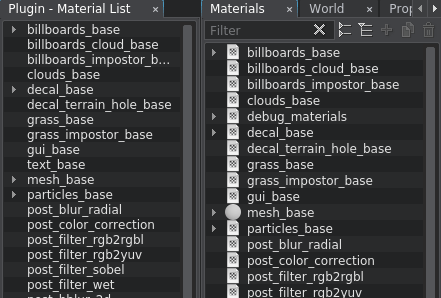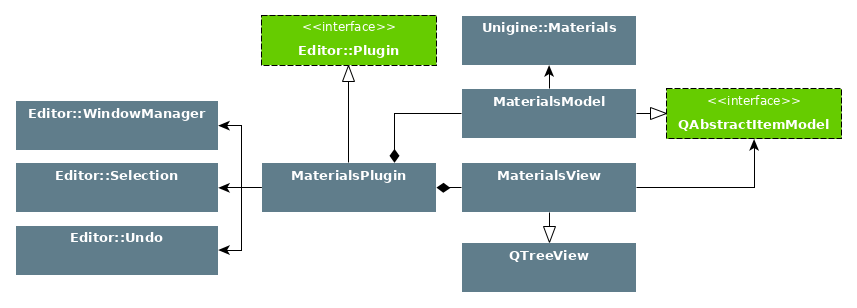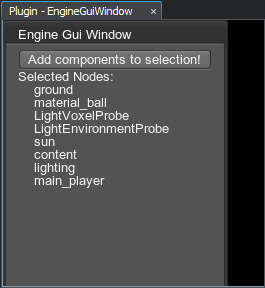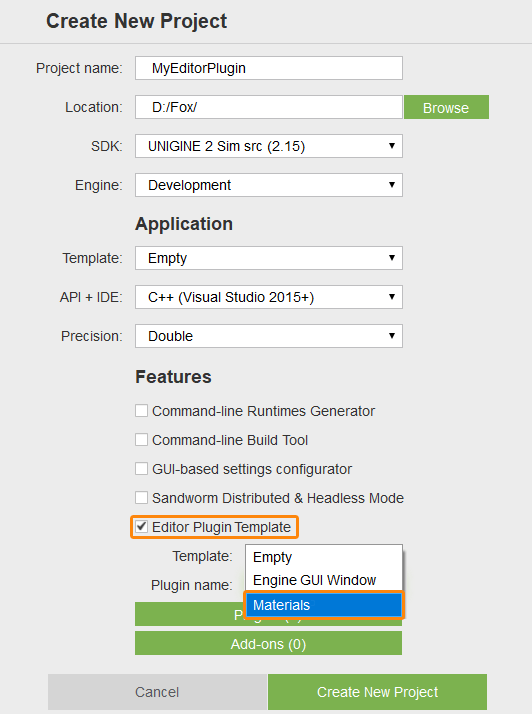Creating Your First Editor Plugin
This article describes how to create an Editor plugin and get the first impression of what a plugin consists of and what its general structure is.
UnigineEditor is an application written entirely in C++ relying a lot on the Qt5 framework infrastructure. So, in order to extend its functionality not only C++ programming skills are required, but you should also be familiar with the Qt5 framework, and CMake build system (especially if you use Linux).
See Also#
- Extending Editor Functionality article for more information on UnigineEditor's Plugin System and extensions.
- Editor API Reference for more information on all available classes.
Plugin Templates#
For your convenience there are two project templates (Engine GUI Window and Materials) that you can use as a basis to create your own plugin. Below you'll find a brief description of each template.
Materials Plugin#
This plugin template implements the basic functionality of the Editor's Materials Hierarchy window (see the picture below).

Basically the plugin's architecture looks as follows:

The MaterialsPlugin class is an initialization point and complete representation of the plugin. It creates necessary data model and via the base interface associates it with the widget, which displays the hierarchy. The model directly interacts with the Materials Manager and transforms information on materials to the required structure.
The plugin interacts with Engine Materials System and Editor's external subsystems:
- Adds a widget to the WindowManager;
- Adds a new item to the main menu bar;
- Updates the state of materials widget when the global selection is changed;
- Updates the global selection when the local selection is changed by sending a SelectionAction to the Undo stack.
Engine Gui Window Plugin#
This plugin template implements a simple dockable window of the UnigineEditor with a simple GUI example that displays the current selection in the World Nodes hierarchy window, and enables you to assign a C++ component to selected nodes (see the picture below).

Basically the plugin's architecture looks as follows:
The EngineGuiWindowPlugin class is an initialization point and complete representation of the plugin.
The plugin interacts with Editor's external subsystems:
- Adds a widget to the WindowManager;
- Adds a new item to the main menu bar;
- Interacts with Editor's Drag&Drop System and in can draggin and dropping files within the window area, prints their names to the Console;
- Monitors current window focus state;
- Updates the global selection when the local selection is changed by sending a SelectionAction to the Undo stack, when a node is selected and the Add components to selection! button is clicked.
And the following Engine subsystems:
- C++ Component System
- GUI System
- Input System
Using Plugin Template#
So, to start developing your plugin for UnigineEditor perform the following actions:
- Check the Editor Plugin Template option when creating a new project in the SDK Browser (or choose Other Actions -> Configure Project in case you want to use your new Editor plugin in an existing project)
Choose one of the plugin templates offered in the dropdown, or use an Empty template to create a new plugin from scratch (here you'll need to specify plugin name).

- Click Create New Project (or Update Configuration if you're adding a template to an existing project).
After clicking the Create New Project / Update Configuration button, a separate project for the Editor plugin will be added to your UNIGINE project's source folder and all necessary files will be added to this folder depending on your operating system and API + IDE selection in project settings:
- Windows OS: C++ (Ot-based / CMake) or UnigineScript - CMake will be used to build your plugin.
- Windows OS: C# (.NET 5) or C++ (Visual Studio) - a .vcxproj project will be created and Visual Studio 2015+ will be used to build your plugin.
- Linux - CMake will be used to build your plugin regardless of project configuration.
You can open this project in your IDE, build it, and give it a test drive right in the Editor as the project is pre-configured to launch with the UnigineEditor.
Plugin's Logic Implementation#
Now let's have a quick look at the implementation of our plugin template's logic. As an example let's choose the Materials plugin.
Plugin Class#
The files MaterialsPlugin.h and MaterialsPlugin.cpp define the implementation of our plugin. Let's highlight some important points here.
Header File#
The header file MaterialsPlugin.h defines the interface of the plugin class.
namespace Materials {The plugin is defined in a Materials namespace, which conforms to the coding rules for namespacing in sources.
class MaterialsPlugin : public QObject, public ::Editor::Plugin
{
Q_OBJECT
Q_PLUGIN_METADATA(IID "com.unigine.EditorPlugin" FILE "Materials.json")
Q_INTERFACES(Editor::Plugin)All Editor plugins must be derived from Editor::Plugin class and are QObjects. The Q_PLUGIN_METADATA macro is necessary to create a valid Editor plugin. The IID given in the macro must be com.unigine.EditorPlugin, to identify it as an Editor plugin, and FILE must point to the plugin's meta data file as described in Plugin Meta Data.
bool init() override;
void shutdown() override;The base class defines basic functions that are called during the life cycle of a plugin (on initialization and shutdown), which are here implemented for your new plugin.
Our plugin has three additional custom slots, that are used show the view, set global selection and update the local one when the global is changed.
public slots:
void showView();
void setGlobalSelection(const QModelIndexList &indexes);
void globalSelectionChanged();MaterialsPlugin.h
#pragma once
#include <editor/Plugin.h>
#include <QObject>
#include <QModelIndex>
namespace Materials {
class MaterialsModel;
class MaterialsView;
}
class QAction;
namespace Materials {
class MaterialsPlugin : public QObject, public ::Editor::Plugin
{
Q_OBJECT
Q_PLUGIN_METADATA(IID "com.unigine.EditorPlugin" FILE "MaterialsPlugin.json")
Q_INTERFACES(Editor::Plugin)
public:
~MaterialsPlugin() override;
bool init() override;
void shutdown() override;
public slots:
void showView();
void setGlobalSelection(const QModelIndexList &indexes);
void globalSelectionChanged();
private:
MaterialsModel *model_{nullptr};
MaterialsView *view_{nullptr};
QAction *action_{nullptr};
};
} // namespace MaterialsImplementation File#
This file contains the actual implementation of our plugin and its logic. For more information about implementing the plugin interface, see the Editor::Plugin API documentation and Plugin Life Cycle.
MaterialsPlugin.cpp
#include "MaterialsPlugin.h"
#include "MaterialsView.h"
#include "MaterialsModel.h"
#include "QtMetaTypes.h"
#include <editor/Actions.h>
#include <editor/Undo.h>
#include <editor/Constants.h>
#include <editor/WindowManager.h>
#include <editor/Selection.h>
#include <editor/Selector.h>
#include <QObject>
#include <QMenu>
#include <algorithm>
#include <iterator>
using Editor::Selection;
using Editor::SelectionAction;
using Editor::WindowManager;
using Editor::SelectorGUIDs;
namespace Materials
{
MaterialsPlugin::~MaterialsPlugin() = default;
bool MaterialsPlugin::init()
{
model_ = new MaterialsModel(this);
view_ = new MaterialsView(model_);
view_->setWindowTitle("Plugin - Material List");
view_->setObjectName("PluginMaterialsView");
WindowManager::add(view_, WindowManager::ROOT_AREA_LEFT);
connect(view_, &MaterialsView::selected, this, &MaterialsPlugin::setGlobalSelection);
QMenu *menu = WindowManager::findMenu(Constants::MM_WINDOWS);
action_ = menu->addAction("Plugin - Material List", this, &MaterialsPlugin::showView);
connect(Selection::instance(), &Selection::changed,
this, &MaterialsPlugin::globalSelectionChanged);
return true;
}
void MaterialsPlugin::shutdown()
{
QMenu *menu = WindowManager::findMenu(Constants::MM_WINDOWS);
menu->removeAction(action_);
action_ = nullptr;
disconnect(
Selection::instance(), &Selection::changed, this, &MaterialsPlugin::globalSelectionChanged);
disconnect(view_);
WindowManager::remove(view_);
delete view_;
view_ = nullptr;
delete model_;
model_ = nullptr;
}
void MaterialsPlugin::showView()
{
WindowManager::show(view_);
}
void MaterialsPlugin::setGlobalSelection(const QModelIndexList &indexes)
{
disconnect(Selection::instance(), &Selection::changed,
this, &MaterialsPlugin::globalSelectionChanged);
Unigine::Vector<Unigine::UGUID> guids;
guids.reserve(indexes.size());
std::transform(std::begin(indexes), std::end(indexes), std::back_inserter(guids),
[](const QModelIndex &idx)
{ return idx.data(MaterialsModel::GUID_ROLE).value<Unigine::UGUID>(); });
SelectionAction::applySelection(SelectorGUIDs::createMaterialsSelector(guids));
connect(Selection::instance(), &Selection::changed,
this, &MaterialsPlugin::globalSelectionChanged);
}
void MaterialsPlugin::globalSelectionChanged()
{
using namespace std;
if (auto selector = Selection::getSelectorMaterials())
{
const Unigine::Vector<Unigine::UGUID> &guids = selector->guids();
QModelIndexList indexes;
indexes.reserve(guids.size());
transform(begin(guids), end(guids), back_inserter(indexes),
[this](const Unigine::UGUID &guid) { return model_->index(guid); });
auto it = remove(begin(indexes), end(indexes), QModelIndex());
indexes.erase(it, end(indexes));
QSignalBlocker blocker(view_);
view_->globalSelectionChanged(indexes);
}
else if(auto selector = Selection::getSelectorRuntimes())
{
// TODO(SiN_Bizkit: 17/11/19): impl.
}
else
{
view_->clearSelection();
}
}
} // namespace MaterialsModel Class#
Header File#
MaterialsModel.h
#pragma once
#include <QAbstractItemModel>
namespace Unigine { class UGUID; };
namespace Materials
{
class MaterialsModel final : public QAbstractItemModel
{
class Item;
public:
enum Role
{
GUID_ROLE = Qt::UserRole + 1
};
MaterialsModel(QObject *parent = nullptr);
~MaterialsModel() override;
QModelIndex index(int row, int column, const QModelIndex &parent = QModelIndex()) const override;
QModelIndex index(const Unigine::UGUID &guid) const;
QModelIndex parent(const QModelIndex &child) const override;
int rowCount(const QModelIndex &parent = QModelIndex()) const override;
int columnCount(const QModelIndex &parent = QModelIndex()) const override;
QVariant data(const QModelIndex &index, int role = Qt::DisplayRole) const override;
protected:
void fetchMore(const QModelIndex &parent) override;
bool canFetchMore(const QModelIndex &parent) const override;
private:
Item *const root_;
};
} // namespace MaterialsImplementation File#
MaterialsModel.cpp
#include "MaterialsModel.h"
#include "QtMetaTypes.h"
#include <UnigineGUID.h>
#include <UnigineMaterials.h>
#include <UnigineFileSystem.h>
#include <QDebug>
using Unigine::UGUID;
namespace Materials
{
////////////////////////////////////////////////////////////////////////////////
// MaterialsModel::Item.
////////////////////////////////////////////////////////////////////////////////
class MaterialsModel::Item
{
public:
static Item *createRootItem(MaterialsModel *model);
Item(Item *parent, MaterialsModel *model, const UGUID &guid);
~Item();
QModelIndex index() const;
void append(Item *item);
Item *child(int idx);
Item *find(const UGUID &guid) const;
int childCount() const;
Item *parent();
int row() const;
QVariant data(int role) const;
void fetchMore();
bool canFetchMore() const;
private:
Item *parent_ = nullptr; // Not owned.
MaterialsModel *model_ = nullptr; // Not owned.
QVector<Item *> children_; // Owned.
UGUID guid_;
};
MaterialsModel::Item *MaterialsModel::Item::createRootItem(MaterialsModel *model)
{
Item *root = new Item(nullptr, model, UGUID());
const int size = Unigine::Materials::getNumMaterials();
for (int i = 0; i < size; ++i)
{
const Unigine::MaterialPtr mat = Unigine::Materials::getMaterial(i);
if (mat->isHidden())
{
continue;
}
if (const Unigine::MaterialPtr &parent_mat = mat->getParent())
{
if (!parent_mat->isHidden())
{
continue;
}
}
root->children_.push_back(new Item(root, model, mat->getGUID()));
}
return root;
}
MaterialsModel::Item::Item(Item *parent, MaterialsModel *model, const UGUID &guid)
: parent_(parent), model_(model), guid_(guid)
{
}
MaterialsModel::Item::~Item()
{
qDeleteAll(children_);
}
QModelIndex MaterialsModel::Item::index() const
{
if (!parent_ || guid_.isEmpty())
{
return QModelIndex();
}
return model_->createIndex(row(), 0, const_cast<Item *>(this));
}
void MaterialsModel::Item::append(Item *item)
{
const int size = children_.size();
model_->beginInsertRows(index(), size, size);
item->parent_ = this;
children_.push_back(item);
model_->endInsertRows();
}
auto MaterialsModel::Item::child(int idx) -> Item *
{
return ((idx >= 0) && (idx < children_.size()))
? children_[idx]
: nullptr;
}
auto MaterialsModel::Item::find(const UGUID &guid) const -> Item *
{
for (Item *child: children_)
{
if (child->guid_ == guid)
{
return child;
}
if (child->canFetchMore())
{
child->fetchMore();
}
if (Item *grandchild = child->find(guid))
{
return grandchild;
}
}
return nullptr;
}
int MaterialsModel::Item::childCount() const
{
if (!guid_.isValid())
{
return children_.size();
}
const Unigine::MaterialPtr mat = Unigine::Materials::findMaterialByGUID(guid_);
if (!mat)
{
return 0;
}
int count = mat->getNumChildren();
for (int i = count - 1; i >= 0; --i)
{
if (mat->getChild(i)->isHidden())
{
--count;
}
}
return count;
}
MaterialsModel::Item *MaterialsModel::Item::parent()
{
return parent_;
}
int MaterialsModel::Item::row() const
{
if (parent_)
{
return parent_->children_.indexOf(const_cast<Item *>(this));
}
return 0;
}
QVariant MaterialsModel::Item::data(int role) const
{
if (Qt::DisplayRole == role)
{
const Unigine::MaterialPtr &mat = Unigine::Materials::findMaterialByGUID(guid_);
if (!mat)
{
// TODO(victor 8/7/20): process adding new materials and removing old ones.
const QString name =
tr("Removed - %1").arg(QLatin1String(guid_.getString()));
return QVariant::fromValue(name);
}
const UGUID &file_mat_guid = Unigine::FileSystem::getGUID(mat->getPath());
const UGUID &asset_guid = Unigine::FileSystemAssets::resolveAsset(file_mat_guid);
const Unigine::String &virtual_path = Unigine::FileSystem::getVirtualPath(asset_guid);
const Unigine::StringStack<> file_name = Unigine::String::filename(virtual_path);
return QVariant::fromValue(QString(file_name.get()));
}
if (MaterialsModel::GUID_ROLE == role)
{
return QVariant::fromValue(guid_);
}
return QVariant();
}
void MaterialsModel::Item::fetchMore()
{
const Unigine::MaterialPtr &mat = Unigine::Materials::findMaterialByGUID(guid_);
if (!mat)
{
// TODO(victor 8/7/20): process adding new materials and removing old ones.
return;
}
const int size = mat->getNumChildren();
QVector<Item *> items;
items.reserve(size);
for (int i = 0; i < size; ++i)
{
const Unigine::MaterialPtr child_mat = mat->getChild(i);
if (child_mat->isHidden())
{
continue;
}
items.push_back(new Item(this, model_, child_mat->getGUID()));
}
if (items.empty())
{
return;
}
const int cur_size = children_.size();
model_->beginInsertRows(index(), cur_size, cur_size + items.size() - 1);
std::copy(std::begin(items), std::end(items), std::back_inserter(children_));
model_->endInsertRows();
}
bool MaterialsModel::Item::canFetchMore() const
{
return children_.empty() && childCount();
}
////////////////////////////////////////////////////////////////////////////////
// MaterialsModel.
////////////////////////////////////////////////////////////////////////////////
MaterialsModel::MaterialsModel(QObject *parent)
: QAbstractItemModel(parent)
, root_(Item::createRootItem(this))
{
}
MaterialsModel::~MaterialsModel()
{
delete root_;
}
QModelIndex MaterialsModel::index(int row, int column, const QModelIndex &parent) const
{
if (column > 0)
{
return {};
}
Item *parent_item = nullptr;
if (!parent.isValid())
{
parent_item = root_;
}
else
{
parent_item = static_cast<Item *>(parent.internalPointer());
}
Item *child_item = parent_item->child(row);
return child_item
? createIndex(row, column, child_item)
: QModelIndex();
}
QModelIndex MaterialsModel::index(const UGUID &guid) const
{
if (guid.isEmpty())
{
return QModelIndex();
}
Item *item = root_->find(guid);
return item ? item->index() : QModelIndex();
}
QModelIndex MaterialsModel::parent(const QModelIndex &child) const
{
if (!child.isValid())
{
return QModelIndex();
}
Item *child_item = static_cast<Item *>(child.internalPointer());
Item *parent_item = child_item->parent();
return (parent_item != root_)
? createIndex(parent_item->row(), 0, parent_item)
: QModelIndex();
}
int MaterialsModel::rowCount(const QModelIndex &parent) const
{
if (parent.column() > 0)
{
return 0;
}
Item *parent_item = nullptr;
if (!parent.isValid())
{
parent_item = root_;
}
else
{
parent_item = static_cast<Item *>(parent.internalPointer());
}
return parent_item->childCount();
}
int MaterialsModel::columnCount(const QModelIndex &parent) const
{
return 1;
}
QVariant MaterialsModel::data(const QModelIndex &index, int role) const
{
if (!index.isValid())
{
return QVariant();
}
Item *item = static_cast<Item *>(index.internalPointer());
return item->data(role);
}
void MaterialsModel::fetchMore(const QModelIndex &parent)
{
if (!parent.isValid())
{
return;
}
Item *item = static_cast<Item *>(parent.internalPointer());
item->fetchMore();
}
bool MaterialsModel::canFetchMore(const QModelIndex &parent) const
{
if (!parent.isValid())
{
return false;
}
Item *item = static_cast<Item *>(parent.internalPointer());
return item->canFetchMore();
}
} // namespace MaterialsView Class#
Header File#
MaterialsView.h
#pragma once
#include <QWidget>
#include <QModelIndex>
namespace Unigine { class UGUID; }
class QAbstractItemModel;
class QItemSelection;
class QTreeView;
namespace Materials
{
class MaterialsView : public QWidget
{
Q_OBJECT
public:
MaterialsView(QAbstractItemModel *model, QWidget *parent = nullptr);
~MaterialsView();
signals:
void selected(const QModelIndexList &indexes);
public slots:
void clearSelection();
void globalSelectionChanged(const QModelIndexList &indexes);
private slots:
void selectionChanged(const QItemSelection &selection);
private:
QTreeView *view_ = nullptr;
};
} // namespace MaterialsImplementation File#
MaterialsView.cpp
#include "MaterialsView.h"
#include <QAbstractItemModel>
#include <QVBoxLayout>
#include <QTreeView>
namespace Materials
{
MaterialsView::MaterialsView(QAbstractItemModel *model, QWidget *parent)
: QWidget{parent}
{
view_ = new QTreeView();
view_->setAlternatingRowColors(true);
view_->setSelectionMode(QAbstractItemView::ExtendedSelection);
view_->setSelectionBehavior(QAbstractItemView::SelectRows);
view_->setHeaderHidden(true);
auto vl = new QVBoxLayout(this);
vl->setContentsMargins(2, 2, 2, 2);
vl->addWidget(view_);
view_->setModel(model);
connect(view_->selectionModel(), &QItemSelectionModel::selectionChanged
, this, &MaterialsView::selectionChanged);
}
MaterialsView::~MaterialsView() = default;
void MaterialsView::clearSelection()
{
view_->selectionModel()->clearSelection();
}
void MaterialsView::globalSelectionChanged(const QModelIndexList &indexes)
{
if (indexes.empty())
{
clearSelection();
return;
}
view_->setCurrentIndex(indexes.back());
QItemSelection item_selection;
for (const QModelIndex &index: indexes)
{
item_selection.append(QItemSelectionRange(index));
}
view_->selectionModel()->select(item_selection, QItemSelectionModel::ClearAndSelect);
view_->scrollTo(indexes.back());
}
void MaterialsView::selectionChanged(const QItemSelection &selection)
{
emit selected(view_->selectionModel()->selectedIndexes());
}
} // namespace MaterialsAuxiliary File#
This file contains registration of additional metatypes to be used in our plugin to make them known to Qt's meta-object system (to be able to put and get Unigine::UGUID to and out of the QVariant), we need Unigine::UGUID.
QtMetaTypes.h
#pragma once
// including UnigineGUID.h containing definition of the metatype we're going to declare
#include <UnigineGUID.h>
// including QMetaType to be able to declare metatypes
#include <QMetaType>
// registering the Unigine::UGUID type to make it known to Qt's meta-object system
Q_DECLARE_METATYPE(Unigine::UGUID)Building the Plugin#
Using MS Visual Studio#
In case you're using MS Visual Studio, there is a .vcxproj file in your plugin folder just select the desired configuration (Debug or Release) and choose Build Solution in the main menu. The project is pre-configured to launch with the UnigineEditor so you can run and test it right from your IDE (e.g. simply hit the default Ctrl + F5 hotkey in Visual Studio).
Using CMake#
All files required to build our plugin using CMake (CMakeList.txt and Materials.json describing our Materials plugin and its dependencies) are automatically added to the corressponding folder of your plugin inside your UNIGINE project's source folder. So, launch CMake to build the plugin.
Running the Plugin#
As the plugin is built, all resulting files are automatically copied to the following folders (according to the build type), so that UnigineEditor's Plugin System could load it automatically:
- %project%/bin/editor — for Release build;
- %project%/bin/editor_debug — for Debug build.
And finally we launch the UnigineEditor to check our plugin. If everything was done properly, you should see the MaterialsPlugin plugin in the list of windows (Help -> Plugins) and a new Plugin - Material List item should be added to the Windows menu.
